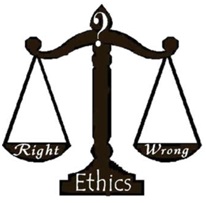|
 |
|
 |
Ethics
Ethics is... Choosing the right thing and doing it (also called morality).
You feel good (have a clear conscience), if you make the right choice.
We need principles (or values) to guide these ethical (or moral) decisions.
How to be ethical and be a good person
1. Practise the right principles
Moses gave us the Ten Commandments, summarized by Jesus as
These are similar to the beliefs of other religions like Islam.
Plato and Aristotle’s (pictured right) four main principles (“cardinal virtues”) are:
a) courage (to do what’s right and physical bravery).
b) justice (fairness).
c) temperance (self-discipline and moderation i.e. avoiding excess).
d) prudence (thinking wisely and then doing the right thing). Other virtues are:
a) faith Belief in something that is good and worth striving for.
b) hope
c) charity (or love) Selfless giving (also called altruism).
d) humility Admitting your ignorance and insignificance.
2. Do your duty Duty is what you should (or ought) to do. It may force you to put others before yourself (i.e. being altruistic). But don’t let duty weigh you down so much that you miss exciting opportunities The Chinese philosopher, Lao Tzu (pictured right) said that “life is an opportunity and not an obligation”.
3. Love yourself to love others You must have self-esteem and believe in yourself, or you won’t have the self-motivation or confidence to help others. Good people have time to themselves to make themselves better people. But helping yourself (selfishness) can hurt others.
4. The human spirit The Greek philosopher, Plato (pictured right), said your soul has three parts:
Spirit gives us the strength to be good and do difficult things. . 5. Reflection You must give yourself time to think (perhaps in meditation or prayer). This peaceful reflection will give you a clearer idea to know what is right, particularly when the decision is not straightforward. 6. Think of the people you love What would they judge what you are doing? If you’re ashamed, you’ve got to change.
7. Follow your instinct What’s your gut feeling about what you are doing? Does it make you feel good or bad?
8. Balance opposites
a) you and me Help yourself (for self-esteem) to help others (see point 3).
b) thrift and generosity Look after your money but be kind to others.
c) toughness and tenderness Be hard on people (e.g. constructive criticism) to help them (called tough love).
d) dogmatism and pragmatism Dogmatically believing in certain values like love but applying them differently in different situations (pragmatism).
9. Think of your funeral and legacy What will people say about you at your funeral? What will you be remembered for? These questions will make you think of the life you should lead. Your life will be judged on your relationships, not money and possessions.
10. Balancing good and bad It isn’t always a straightforward choice between right and wrong. You may have to choose between two rights (e.g. hard work and family), or the lesser of two evils (e.g. redundancies or a company’s liquidation). The American theologian, Paul Tillich (pictured right), said that all ethical decisions have “ambiguity”, a mixture of good and bad.
Key quotes explained
“Happy are the pure in heart” - Jesus (in the Sermon on the Mount). Jesus said the happiest people try their hardest to be good, love others with great humility and never sacrifice their principles pursuing power and money.
St. Augustine (pictured right) summed up Jesus’s philosophy by saying: “Forgive and you will be forgiven and give and you will receive”. But Augustine also said: “To err is human, to persist in error is devilish”. Nobody’s perfect, but you must always try to be good.
“Hell has three gates, lust, anger and greed” - Bhagavad Gita (the holy Hindu poem, the Son of God). Overcome these three evils and you’ll be a much better person. “Right is might”, said Abraham Lincoln, the American president (pictured right).
“Character is higher than intellect” - Ralph Waldo Emerson, American philosopher (pictured right) Character is vital – seeking good and fighting evil. This means standing up for what you think is right. The American civil rights leader, Martin Luther King, said: “We shall have to repent in this generation, not so much for the evil deeds of the wicked people but the appalling silence of the good people”
“Believe so that you may
understand” - St. Augustine (Algerian philosopher).(pictured right) There are certain things (like God) that you can only believe and not fully understand. Belief gives you the certainty to deal with the uncertainties of life.
Jacob Bronowski (pictured right) was a brilliant scientist, whose dedication to scientific questioning and truth was balanced by an unshakeable belief in what was right. “My life has been happy because I never had any uncertainty about the meaning of the word good”, Bronowski said.
Best books
Benjamin Franklin (pictured right) , Autobiography (1788) We should pursue moral perfection and make a habit of virtue. This will also make you successful, because good and kind people are liked and trusted. Ask yourself at the start and end of each day: what good shall I do? And what good have I done?
Kenneth Blanchard (pictured right) & Norman Vincent Peale (pictured right), The Power of Ethical Management (1988) The 5 P’s make you a good person:
Lord Longford (pictured right), Humility (1970) Humility (the greatest of virtues) is:
|
|
|
||
|
|
|
||
|
||
| Copyright © wisdomtowin.com All Rights Reserved | ||
|

















